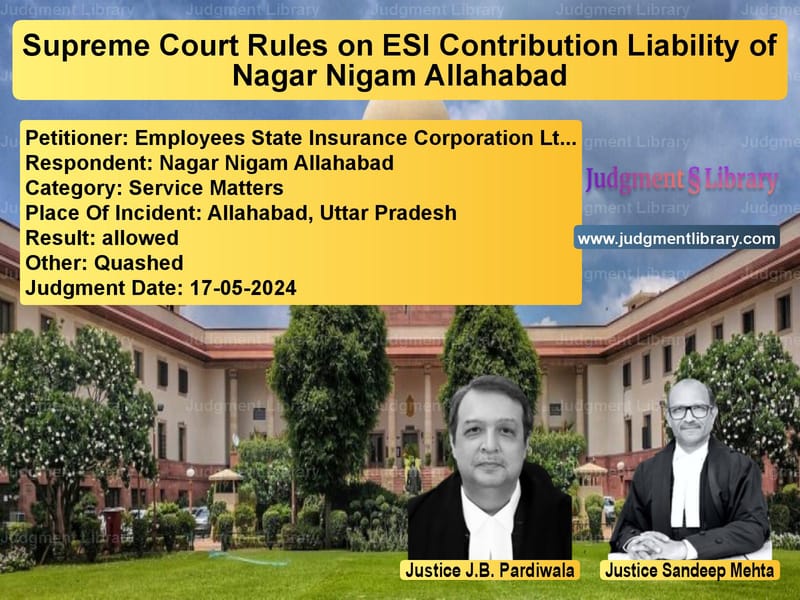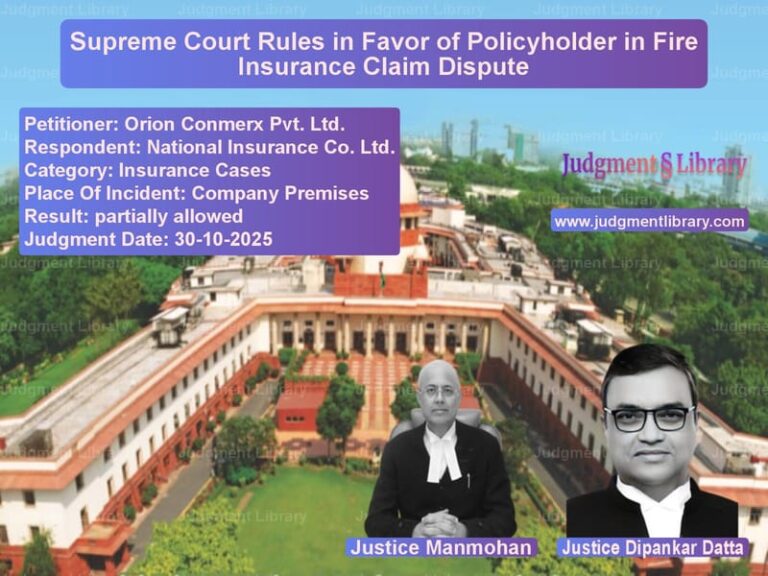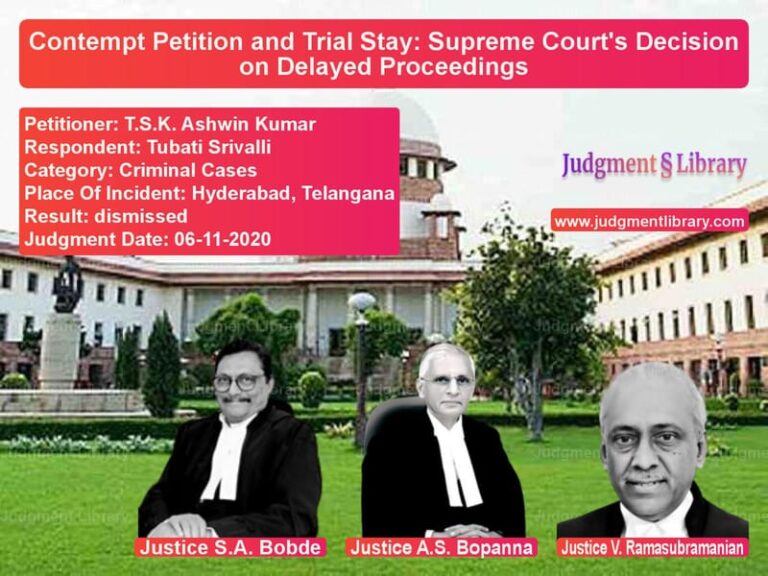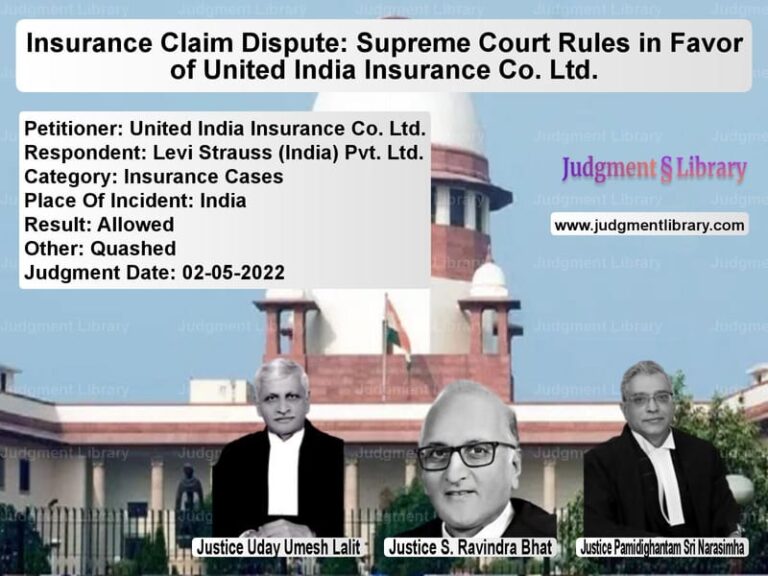Supreme Court Rules on ESI Contribution Liability of Nagar Nigam Allahabad
The Supreme Court of India recently ruled in Employees State Insurance Corporation Ltd. v. Nagar Nigam Allahabad, clarifying whether the Employees’ State Insurance (ESI) Act, 1948 applies to municipal corporations operating workshops. The Court set aside the Allahabad High Court’s ruling, holding that the Nagar Nigam Allahabad was liable for ESI contributions unless it obtained an exemption under Section 90 of the Act.
Background of the Case
The case arose when the Employees’ State Insurance Corporation (ESIC) issued a recovery notice to Nagar Nigam Allahabad, demanding unpaid ESI contributions for its workshop employees. The municipal corporation had previously been paying contributions but stopped in 1978 without seeking formal exemption.
After several notices, ESIC deducted the amount from the Nagar Nigam’s bank account. The municipal body challenged the recovery in the Allahabad High Court, arguing that its workshop was not a ‘factory’ under the ESI Act and therefore not liable for contributions.
The High Court ruled in favor of Nagar Nigam, holding that:
- The workshop was not engaged in ‘manufacturing’ as defined under the ESI Act.
- ESIC had wrongly classified it as a ‘factory’.
- The recovery notice was invalid and the deducted amount must be refunded.
ESIC appealed this decision to the Supreme Court.
Key Legal Issues
- Whether Nagar Nigam’s workshop met the definition of a ‘factory’ under the ESI Act.
- Whether non-payment of ESI contributions after 1978 was legally justified.
- Whether the High Court was correct in quashing the recovery notice.
Arguments by ESIC (Appellant)
- The workshop repaired and maintained vehicles, employing more than 20 workers, thereby qualifying as a ‘factory’ under Section 2(12) of the ESI Act.
- The High Court ignored the fact that the municipal body had been paying ESI contributions for years before arbitrarily stopping.
- If Nagar Nigam sought exemption, it should have applied under Section 90 of the ESI Act.
- The High Court’s decision contradicted the Supreme Court ruling in ESIC v. Kakinada Municipality (2022) 2 SCC 56, which held that municipal workshops are covered under the ESI Act unless exempted.
Arguments by Nagar Nigam Allahabad (Respondent)
- The workshop was not engaged in a ‘manufacturing process’ but only occasional repairs of municipal vehicles.
- Its workers were already receiving medical and other benefits, making ESI coverage unnecessary.
- The recovery action was arbitrary since ESIC had not previously enforced payment.
- The ESI Act was never intended to apply to municipal corporations.
Supreme Court’s Observations
The Supreme Court, comprising Justices J.B. Pardiwala and Sandeep Mehta, ruled in favor of ESIC. Key observations included:
- Under Section 2(12) of the ESI Act, any premises where 10 or more workers are engaged in manufacturing is a ‘factory.’
- The municipal body’s workshop, engaged in systematic repairs, qualified as a factory.
- “The burden of proving exemption lies on the employer. Nagar Nigam continued to pay ESI contributions until 1978, indicating prior acknowledgment of coverage.”
- The High Court erred in exercising writ jurisdiction under Article 226 when an alternative remedy existed under Section 75 of the ESI Act.
The Court also cited:
- J.P. Lights India v. Regional Director, ESIC (2023 SCC OnLine SC 1271): Holding that workshops engaged in machinery repairs qualify as ‘factories.’
- ESIC v. Kakinada Municipality: Confirming that municipal workshops fall under ESI Act unless exempted.
Final Judgment
- The Supreme Court allowed the appeal and set aside the High Court ruling.
- The recovery notice was upheld, and Nagar Nigam must pay the outstanding contributions.
- The municipal body may seek exemption under Section 90 but remains liable until granted.
Implications of the Judgment
- The ruling ensures that municipal workshops comply with labor welfare laws.
- It reinforces that exemption must be formally sought, not assumed.
- The judgment discourages arbitrary withdrawal from statutory schemes like ESI.
- It strengthens ESIC’s authority to recover dues from defaulting entities.
Conclusion
The Supreme Court’s decision in ESIC v. Nagar Nigam Allahabad reinforces employer obligations under the ESI Act, 1948. It sets a precedent that municipal bodies operating workshops are subject to ESI unless formally exempted. The ruling ensures continued social security coverage for workers while upholding statutory compliance.
Petitioner Name: Employees State Insurance Corporation Ltd..Respondent Name: Nagar Nigam Allahabad.Judgment By: Justice J.B. Pardiwala, Justice Sandeep Mehta.Place Of Incident: Allahabad, Uttar Pradesh.Judgment Date: 17-05-2024.
Don’t miss out on the full details! Download the complete judgment in PDF format below and gain valuable insights instantly!
Download Judgment: employees-state-insu-vs-nagar-nigam-allahaba-supreme-court-of-india-judgment-dated-17-05-2024.pdf
Directly Download Judgment: Directly download this Judgment
See all petitions in Pension and Gratuity
See all petitions in Public Sector Employees
See all petitions in Employment Disputes
See all petitions in Contractual Employment
See all petitions in Other Cases
See all petitions in Judgment by J.B. Pardiwala
See all petitions in Judgment by Sandeep Mehta
See all petitions in allowed
See all petitions in Quashed
See all petitions in supreme court of India judgments May 2024
See all petitions in 2024 judgments
See all posts in Service Matters Category
See all allowed petitions in Service Matters Category
See all Dismissed petitions in Service Matters Category
See all partially allowed petitions in Service Matters Category







